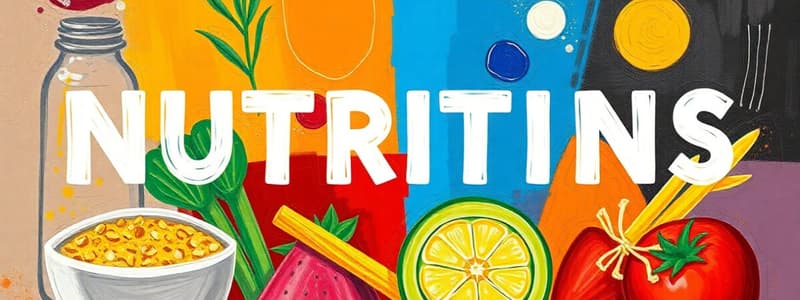Podcast
Questions and Answers
What type of carbohydrate is primarily associated with providing long-term energy?
What type of carbohydrate is primarily associated with providing long-term energy?
- Cellulose
- Glucans
- Sugars
- Starches (correct)
Which vitamin is known for its role in regulating body functions and can be found in fruits and vegetables?
Which vitamin is known for its role in regulating body functions and can be found in fruits and vegetables?
- Vitamin B
- Vitamin C (correct)
- Vitamin D
- Vitamin K
Which type of fat is liquid at room temperature?
Which type of fat is liquid at room temperature?
- Saturated fat
- Hydrogenated fat
- Trans-fat
- Unsaturated fat (correct)
What is the main role of minerals in the body?
What is the main role of minerals in the body?
Which class of nutrients is made up of amino acids and is essential for the growth and repair of body tissues?
Which class of nutrients is made up of amino acids and is essential for the growth and repair of body tissues?
Which food sources are considered complete proteins?
Which food sources are considered complete proteins?
What type of carbohydrate aids in digestion but cannot be digested itself?
What type of carbohydrate aids in digestion but cannot be digested itself?
Which type of vitamin is stored in body fats?
Which type of vitamin is stored in body fats?
Flashcards
Nutrients
Nutrients
Substances vital for growth and maintenance, found in food.
Carbohydrates
Carbohydrates
Body's main energy source; simple sugars (quick energy) or complex starches (long-term energy).
Fiber
Fiber
Special type of carbohydrate from plants; aids digestion by eliminating waste.
Fats
Fats
Signup and view all the flashcards
Proteins
Proteins
Signup and view all the flashcards
Vitamins
Vitamins
Signup and view all the flashcards
Minerals
Minerals
Signup and view all the flashcards
Fat-soluble vitamins
Fat-soluble vitamins
Signup and view all the flashcards
Study Notes
Introduction to Nutrition
- Nutrition is the study of nutrients and how the body uses them
- The body is a finely tuned vehicle, providing it with good fuel is crucial for optimal functioning
What is a Nutrient?
- Nutrients are substances essential for growth and maintenance
- Nutrients are found in the foods we eat
- A variety of foods is needed because a single food often lacks all the essential nutrients
Six Essential Nutrients
- A simple mnemonic to remember the six essential nutrients is "Can Fanny Play Violin Much Worse?"
- Carbohydrates
- Fats
- Proteins
- Vitamins
- Minerals
- Water
Carbohydrates
- The body's primary energy source
- Two types: simple sugars (rapid energy) and complex carbohydrates (starches - long-lasting energy)
- Simple carbohydrates (sugars) found in candies, sodas, and doughnuts
- Complex carbohydrates found in foods like pasta, bread, and starchy vegetables (peas and potatoes)
- Fiber is a special type of carbohydrate
- Derived from plant sources (fruits, vegetables, whole grains)
- Can't be digested but aids in digestion by eliminating waste products
Fats
- Used by the body to store energy, insulate, and protect organs
- Fats have twice the calories of carbohydrates
- Solid at room temperature (saturated fats) or liquid at room temperature (unsaturated fats)
- Types of fats include saturated, unsaturated, trans-fat, and cholesterol
Proteins
- Building blocks for growth and repair
- Found in skin, hair, blood, muscles, and vital organs
- Made up of amino acids
- Sources include plant proteins (incomplete) and animal proteins (complete)
- Plant sources include beans, soy, lentils
- Animal sources include beef, pork, fish, eggs, cheese, and poultry
Vitamins
- Needed in small amounts to regulate body functions
- Assist in using other nutrients, storing and using energy, and fighting infection
- Types of vitamins include A, B, C, D, E, and K
- Mostly found in fruits, vegetables, and dairy
- Some vitamins are stored in the body's fat cells (fat-soluble) and others are dissolved in water (water-soluble)
Minerals
- Control important chemical reactions in the body
- Needed in small amounts to maintain strong bones, healthy teeth, and blood
- Sources include milk, salt, spinach, fruits, and vegetables
- Examples include iron, calcium, and iodine
Water
- Essential for survival
- Keeps the body hydrated
- Aids in transporting nutrients and waste products through the body
- Helps with digestion
- Daily requirement is approximately 64 ounces
- Sources include fruits, vegetables, soups, juices, and dairy products
Studying That Suits You
Use AI to generate personalized quizzes and flashcards to suit your learning preferences.




